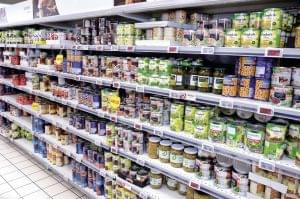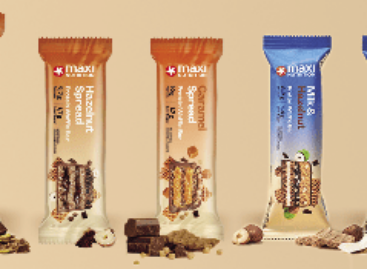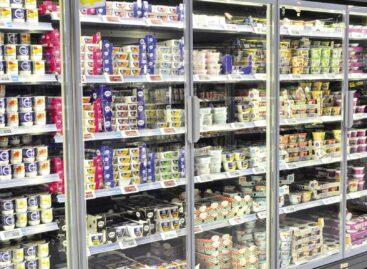Higher expectations, higher canned food prices
After the coronavirus-induced stockpiling craze, the sales of canned vegetables returned to the 2019 level by the autumn of 2020. Luckily the demand for quality canned foods slowly but steadily kept growing.

András Szirbek
marketing director
Bonduelle Central
Europe
András Szirbek, Bonduelle Central Europe Kft.’s sales and marketing director told our magazine that the pandemic transformed market trends: demand grew for classic core products such as canned corn or peas, and shoppers also showed increased interest in beans in sauce. Hypermarkets – where sales had been decreasing – gained momentum again during the pandemic, although only for a transitional period. At the moment it is discounters again who shape the market trends.
They think bigger

László Berényi
sales director
Globus
If we take a look at branded products, what we can see is that convenience stores and hypermarkets are increasingly important in sales – revealed László Berényi, Globus Konzervipari Zrt.’s sales director. He added that sales in promotion still represent a large proportion of total sales

Melinda Péchy
key account manager
Foltin Globe
Melinda Péchy, Foltin Globe Kft.’s key account manager reckons that shoppers like to stock up on canned food if there is an emergency, because these products have a long shelf life and they are easy to store and prepare. During the pandemic shoppers purchased more large-sized products.
Will some canned food products become luxury goods?

Attila Ádám
sales director
GA FOOD
According to Attila Ádám, sales director of GA FOOD Kft., salary costs increased in the case of products made of fruits or vegetables harvested manually. In addition to this, metal has become more expensive so can production costs also jumped. Plus the lack of enough containers has entailed a price increase in shipping from the Far East. If these trends continue, certain canned fish and canned fruit products will become luxury items for Hungarian consumers that they can’t afford. Since demand for quality products has started to increase again, sales of GA FOOD Kft.’s premium Franz Josef Kaiser canned foods are on the rise.

Consumers’ education may be the key to the further development of the canned food market
Their mission is popularising a plant-based diet
Bonduelle’s mission is championing the shift towards a plant-based diet, for which there is growing consumer demand.
András Szirbek told: pulses are more and more popular – sales of these are growing dynamically and there is still a lot of room for growth. Consumers also want canned ready meals or sides that are easy to prepare. A good example of this is various cereals and nuts, which provide a complete dish if they are mixed with vegetables. In the autumn of 2021 Bonduelle launches a ready meal range like this in the Hungarian market. Last year the company rolled out the Gold Prémium canned corn product: this is made of the sweetest corn from the best growing area in Hungary.
No additives and new products
László Berényi talked to our magazine about how important it is for the further development of the canned food market to educate consumers about these products, for instance informing them about the fact that canned vegetables are made without preservatives. This year Globus Konzervipari Zrt. will introduce a unique product range to the market: only water is added to Globus Vital products, so there is no additive, salt or sugar in them.
Melinda Péchy spoke to Trade magazin about those Foltin Globe products that are always popular: Top Fruits canned tomatoes, Losos canned fish products, Top Fruits canned peach, pineapple and fruit mixes. New products include a cherry preserve and canned butter beans.
A more dynamic image

Zsuzsanna Takácsné Rácz
sales director
Del Pierre
Del Pierre Kft. is the distributor of Twist canned tuna. Sales director Zsuzsanna Takácsné Rácz stressed how important a healthy diet is for them, together with a conscious approach when it comes to product packaging. Several new products can be expected from the company this year, in terms of both format and flavour. Last year they put Twist salmon steak in brine (3x80g) and Twist Paté (in two flavours) on the market – both product launches were very successful. Canned tuna products now have a new, more dynamic packaging.
New categories are popular
Import Trade Hungary Kft. is strengthening its presence in the premium canned food segment. Sales director András Gurdon revealed that in 2020 they started to distribute several new product categories in Hungary, e.g. Wenger mustard from Austria, Waldkauz mushrooms from Germany. The company’s Auga BIO soup category made huge progress, due to the lockdown and home office work. Other premium brands that profited from the pandemic situation are Mediterranico jams and trendy BBQUE sauces.

//
Canned tuna performed better than canned vegetables


Zsófia Vörösmarty-Horváth
client consultant
Nielsen Piackutató
Canned vegetables: between June 2020 and May 2021 sales neared HUF 17.5 billion, as they grew by 3 percent in value. NielsenIQ measured a 7-percent plunge in volume sales at 24,000 tonnes. In the given period 46 percent of value sales were realised in 401-2,500m² stores. Private label products had a 55-percent share in value sales and a volume share above 60 percent. In size 301-350g canned vegetables were responsible for one third of value sales. Almost one third of canned vegetables sold were corn products.
Canned tuna: in the examined period sales amounted to HUF 10 billion and this meant a nearly 4-percent sales increase. Volume sales developed by 2 percent and amounted to 2,500 tonnes. More than 60 percent of value sales were realised in 401-2,500m² stores. Private label canned tuna had a 30-percent share in value sales, because its sales performance increased by 17 percent in both value and volume. Sales of manufacturer brands reduced by 1 percent in value and 7 percent in volume. In size smaller than 100g canned tuna and 100-200g products were the most popular – the former’s market share was 46 percent and the latter realised almost half of value sales. //
Related news
Protein Waffle Bar / MaxiNutrition
🎧 Hallgasd a cikket: Lejátszás Szünet Folytatás Leállítás Nyelv: Auto…
Read more >Trend-following milk desserts
🎧 Hallgasd a cikket: Lejátszás Szünet Folytatás Leállítás Nyelv: Auto…
Read more >Related news
The government is supporting dairy farmers with a new measure
🎧 Hallgasd a cikket: Lejátszás Szünet Folytatás Leállítás Nyelv: Auto…
Read more >









